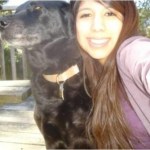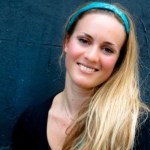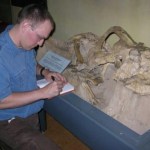Continuing with the tradition from last two years, I will occasionally post interviews with some of the participants of the ScienceOnline2010 conference that was held in the Research Triangle Park, NC back in January. See all the interviews in this series here. You can check out previous years' interviews as well: 2008 and 2009.
Today, I asked Mary Gore from The Duke Medicine Office of News and Communications to answer a few questions.
Welcome to A Blog Around The Clock. Would you, please, tell my readers a little bit more about yourself? Where are you coming from (both geographically and…
SO'10
Sunday, January 17 at 9-10:05am
E. Science online talks between generations - Beatrice Lugger and Christian Rapp:
Description: In huge meetings around the world several organizations try to initiate a dialogue between top scientists and young researchers -the Lindau Meetings of Nobel Laureates are one of them providing numerous opportunities for an exchange of ideas and thoughts between young researchers and Nobel Laureates. The idea is to support this dialogue with a special platform in the web, where current science topics can be discussed and the talks and thoughts can be followed by a…
Continuing with the tradition from last two years, I will occasionally post interviews with some of the participants of the ScienceOnline2010 conference that was held in the Research Triangle Park, NC back in January. See all the interviews in this series here. You can check out previous years' interviews as well: 2008 and 2009.
Today, I asked John McKay from Archy and Mammoth Tales blogs to answer a few questions.
Welcome to A Blog Around The Clock. Would you, please, tell my readers a little bit more about yourself? Where are you coming from (both geographically and philosophically)?
I've…
Sunday, January 17 at 9-10:05am
E. Science online talks between generations - Beatrice Lugger and Christian Rapp:
Description: In huge meetings around the world several organizations try to initiate a dialogue between top scientists and young researchers -the Lindau Meetings of Nobel Laureates are one of them providing numerous opportunities for an exchange of ideas and thoughts between young researchers and Nobel Laureates. The idea is to support this dialogue with a special platform in the web, where current science topics can be discussed and the talks and thoughts can be followed by a…
Continuing with the tradition from last two years, I will occasionally post interviews with some of the participants of the ScienceOnline2010 conference that was held in the Research Triangle Park, NC back in January. See all the interviews in this series here. You can check out previous years' interviews as well: 2008 and 2009.
Today, I asked Patty Gainer from Radford College, VA, to answer a few questions.
Welcome to A Blog Around The Clock. Would you, please, tell my readers a little bit more about yourself? Where are you coming from (both geographically and philosophically)?
Hi, I'm…
Sunday, January 17 at 9-10:05am
E. Science online talks between generations - Beatrice Lugger and Christian Rapp:
Description: In huge meetings around the world several organizations try to initiate a dialogue between top scientists and young researchers -the Lindau Meetings of Nobel Laureates are one of them providing numerous opportunities for an exchange of ideas and thoughts between young researchers and Nobel Laureates. The idea is to support this dialogue with a special platform in the web, where current science topics can be discussed and the talks and thoughts can be followed by a…
North Carolina Sea Grant fisheries specialist Scott Baker talks about "RECTEXT" -- a system that lets tournament anglers report catch data via cell phone text messaging.
Fisheries managers often meet hurdles in collecting recreational fishing data, but RECTEXT has the potential to provide valuable information for gamefish population research. Learn more at www.rectext.org.
Baker demonstrated RECTEXT at the ScienceOnline2010 conference on Jan. 15, 2010. Filmed at Sigma Xi in Research Triangle Park, NC. Flipcam donated by a ScienceOnline sponsor.
North Carolina Sea Grant fisheries specialist Scott Baker talks about "RECTEXT" -- a system that lets tournament anglers report catch data via cell phone text messaging.
Fisheries managers often meet hurdles in collecting recreational fishing data, but RECTEXT has the potential to provide valuable information for gamefish population research. Learn more at www.rectext.org.
Baker demonstrated RECTEXT at the ScienceOnline2010 conference on Jan. 15, 2010. Filmed at Sigma Xi in Research Triangle Park, NC. Flipcam donated by a ScienceOnline sponsor.
Saturday, January 16 at 4:40 - 5:45pm
C. Trust and Critical Thinking - Stephanie Zvan, PZ Myers, Desiree Schell, Greg Laden, Kirsten Sanford
Description: Lay audiences often lack the resources (access to studies, background knowledge of fields and methods) to evaluate the trustworthiness of scientific information as another scientist or a journalist might. Are there ways to usefully promote critical thinking about sources and presentation as we provide information? Can we teach them to navigate competing claims? And can we do it without promoting a distrust of science itself?
Continuing with the tradition from last two years, I will occasionally post interviews with some of the participants of the ScienceOnline2010 conference that was held in the Research Triangle Park, NC back in January. See all the interviews in this series here. You can check out previous years' interviews as well: 2008 and 2009.
Today, I asked Russ Williams from North Carolina Zoological Society and the Russlings blog to answer a few questions.
Welcome to A Blog Around The Clock. Would you, please, tell my readers a little bit more about yourself? Where are you coming from (both…
Saturday, January 16 at 4:40 - 5:45pm
C. Trust and Critical Thinking - Stephanie Zvan, PZ Myers, Desiree Schell, Greg Laden, Kirsten Sanford
Description: Lay audiences often lack the resources (access to studies, background knowledge of fields and methods) to evaluate the trustworthiness of scientific information as another scientist or a journalist might. Are there ways to usefully promote critical thinking about sources and presentation as we provide information? Can we teach them to navigate competing claims? And can we do it without promoting a distrust of science itself?
Continuing with the tradition from last two years, I will occasionally post interviews with some of the participants of the ScienceOnline2010 conference that was held in the Research Triangle Park, NC back in January. See all the interviews in this series here. You can check out previous years' interviews as well: 2008 and 2009.
Today, I asked T. DeLene Beeland to answer a few questions.
Welcome to A Blog Around The Clock. Would you, please, tell my readers a little bit more about yourself? Where are you coming from (both geographically and philosophically)? What is your (scientific)…
Saturday, January 16 at 4:40 - 5:45pm
C. Trust and Critical Thinking - Stephanie Zvan, PZ Myers, Desiree Schell, Greg Laden, Kirsten Sanford
Description: Lay audiences often lack the resources (access to studies, background knowledge of fields and methods) to evaluate the trustworthiness of scientific information as another scientist or a journalist might. Are there ways to usefully promote critical thinking about sources and presentation as we provide information? Can we teach them to navigate competing claims? And can we do it without promoting a distrust of science itself?
Continuing with the tradition from last two years, I will occasionally post interviews with some of the participants of the ScienceOnline2010 conference that was held in the Research Triangle Park, NC back in January. See all the interviews in this series here. You can check out previous years' interviews as well: 2008 and 2009.
Today, I asked Christine Ottery from the MA program in science journalism at City University London to answer a few questions:
Welcome to A Blog Around The Clock. Would you, please, tell my readers a little bit more about yourself? Where are you coming from (both…
Saturday, January 16 at 4:40 - 5:45pm
C. Trust and Critical Thinking - Stephanie Zvan, PZ Myers, Desiree Schell, Greg Laden, Kirsten Sanford
Description: Lay audiences often lack the resources (access to studies, background knowledge of fields and methods) to evaluate the trustworthiness of scientific information as another scientist or a journalist might. Are there ways to usefully promote critical thinking about sources and presentation as we provide information? Can we teach them to navigate competing claims? And can we do it without promoting a distrust of science itself?
Continuing with the tradition from last two years, I will occasionally post interviews with some of the participants of the ScienceOnline2010 conference that was held in the Research Triangle Park, NC back in January. See all the interviews in this series here. You can check out previous years' interviews as well: 2008 and 2009.
Today, I asked Robin Ann Smith from NESCent to answer a few questions.
Welcome to A Blog Around The Clock. Would you, please, tell my readers a little bit more about yourself? Where are you coming from (both geographically and philosophically)? What is your (…
Saturday, January 16 at 4:40 - 5:45pm
C. Trust and Critical Thinking - Stephanie Zvan, PZ Myers, Desiree Schell, Greg Laden, Kirsten Sanford
Description: Lay audiences often lack the resources (access to studies, background knowledge of fields and methods) to evaluate the trustworthiness of scientific information as another scientist or a journalist might. Are there ways to usefully promote critical thinking about sources and presentation as we provide information? Can we teach them to navigate competing claims? And can we do it without promoting a distrust of science itself?
Saturday, January 16 at 4:40 - 5:45pm
C. Trust and Critical Thinking - Stephanie Zvan, PZ Myers, Desiree Schell, Greg Laden, Kirsten Sanford
Description: Lay audiences often lack the resources (access to studies, background knowledge of fields and methods) to evaluate the trustworthiness of scientific information as another scientist or a journalist might. Are there ways to usefully promote critical thinking about sources and presentation as we provide information? Can we teach them to navigate competing claims? And can we do it without promoting a distrust of science itself?
Science and Entertainment: Beyond Blogging
Saturday, January 16 at 2 - 3:05pm
D. Science and Entertainment: Beyond Blogging - Tamara Krinsky and Jennifer Ouellette
Description: Over the past several years, the Internet has tangibly changed the way that movies and TV shows are produced and marketed. Blogs will call out ridiculous scientific errors found in stories and the critique can go viral very quickly; therefore, science advising is on the rise in an attempt to add some semblance of plausibility to your favorite flicks. As tools on the web continue to evolve, filmmakers and television…
Continuing with the tradition from last two years, I will occasionally post interviews with some of the participants of the ScienceOnline2010 conference that was held in the Research Triangle Park, NC back in January. See all the interviews in this series here. You can check out previous years' interviews as well: 2008 and 2009.
Today, I asked Andy Farke from the Raymond M. Alf Museum of Paleontology in Claremont, CA to answer a few questions.
Welcome to A Blog Around The Clock. Would you, please, tell my readers a little bit more about yourself? Where are you coming from (both…






